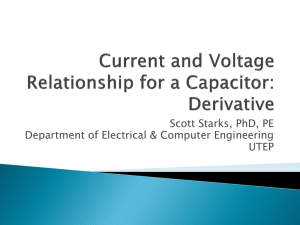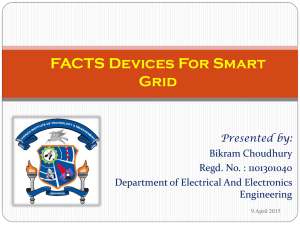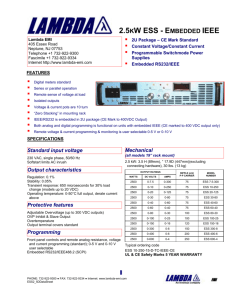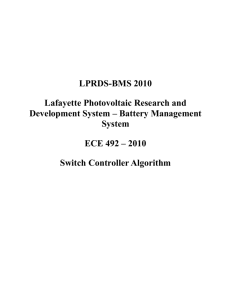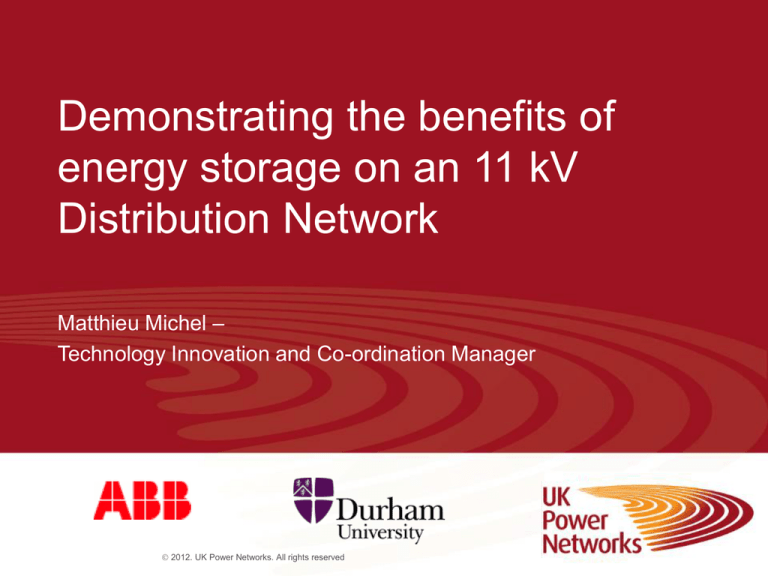
Demonstrating the benefits of
energy storage on an 11 kV
Distribution Network
Matthieu Michel –
Technology Innovation and Co-ordination Manager
2012. UK Power Networks. All rights reserved
Project Objectives:
•
Validate the capabilities of a Li-ion Energy Storage System (ESS)
•
Demonstrate load-shifting and other interventions within the limits of the device
200 kW, 1 hour discharge duration
600 kW, short durations
Power rating
Duration
Real power
Reactive power
Finite (nom 200 kW)
Finite (nom 600 kVAr)
Finite (nom 1hr)
Unlimited
•
Evaluate the network benefits: accommodate additional demand and generation
•
Understand the potential lifetime of the device
•
Presentation:
Early results from Operation of the device
Key considerations: Efficiency, Losses, cost of energy
2012. UK Power Networks. All rights reserved
Progress Highlights:
•
The storage device has operated as a STATCOM since commissioning (April 2011)
•
Exchanges of real power have started (May 2012)
•
Network diagram
Wind farm
(10 turbines)
2.25MW
Hemsby
(Energy
Storage
System)
Martham
Primary
Site where
Additional
monitoring is
being installed
Ormesby
Primary
2012. UK Power Networks. All rights reserved
11.1
High Voltage event caused by
windfarm output triggering ESS to
import reactive power
11.07
10.85
1
11
0.8
Voltage (kV)
D
E
A
D
B
A
N
D
1.2
10.9
10.8
0.6
Increase in windfarm
output resulting in
voltage increase
0.4
Low Voltage
triggering ESS
to export
reactive power
0.2
10.7
0
-0.2
10.6
18-Apr-11
18/04
ESS Volts (kV) [Model]
19/04
19-Apr-11
20-Apr-11
20/04
Windfarm (MW)
ESS_Q (MVAr) [Data] Windfarm
ESS Reactive
Output
Power
ESS Volts (kV) [Model]
2012. UK Power Networks. All rights reserved
21-Apr-11
Reactive Power (MVAr) / Windfarm output (MW)
Operation: STATCOM
Voltage at Hemsby
without ESS
(simulated data)
Voltage at Hemsby
with ESS (Simulated
using real data)
Operation: STATCOM Settings Change - July 2012
•
Tightened under and over voltage targets from 10.96kV ± 0.11kV, to ±0.08kV
•
kVAr exchanged with the network (Number of occurrences) / Voltage band
Week 1
BEFORE SETTING
CHANGES
AFTER SETTING
CHANGES
10.96kV ± 0.11kV
10.96kV ± 0.08kV
Week 2
Week 3
Week 4
2012. UK Power Networks. All rights reserved
Week 5
Week 6
Week 7
Week 8
Operation: Real Power Exchanges - May 2012
Demand increase
due to evening
peak
Drop in demand
due to export
from ESS
Fluctuations due
to Windfarm
output or
variation in
demand
2012. UK Power Networks. All rights reserved
Increase in
demand due to
switching from
Export to Import
Considerations: Round Trip Efficiency and Losses
•
The overall round trip efficiency of the installation is quoted to be more than 90%
•
Several components will
impact the efficiency and
48 kW
losses
AUXILIARIES
1MVA STEP UP
TRANSFORMER
(2.2kV to 11kV)
AND CIRCUIT
BREAKER
•
49.7 kW delivered by batteries
Li-ION BATTERIES
48 kW delivered to network
49.7 kW
•
SVC Light
POWER
CONVERSI
ON SYSTEM
(DC to AC)
50kW discharge scenario:
Each component is being
assessed individually
2012. UK Power Networks. All rights reserved
Considerations: Energy cost and Battery life
Financial impact of an example daily operation:
2 full charges / discharges @ 100kW
£90
Hemsby import
charge
•
Import chage / Export revenue (£)
£80
Export
revenue
(80%
System
Sell price)
£70
£60
£50
£40
On the current Hemsby tariff
Energy import charges will be higher than
the revenue that can be generated from
Import charge
exporting
Export
revenue
£30
a similar amount of energy
£20
£10
£0
Scenario
1: Optimised charge /
Optimised
discharge time
•
Scenario
2: Example
of a worst
Worst
case
case charge / discharge time
Battery life will depend on:
Number of cycles
Depth of discharges
•
1 x daily cycle @ 80% depth of discharge: 10 years
1 x daily cycle @ 40% depth of discharge: 20 years
•
40% / 10,000 Cycles
The impact of each mode of operation on the
battery life will be considered
2012. UK Power Networks. All rights reserved
80% / 3,000 Cycles
Next steps: Device Operations
Control mode 4:
Algorithmic control
based on real time network
measurements and wind farm output
Benefit demonstration
started
Benefit to be demonstrated
Management of Peak power flows
Control mode 3:
Remote
operations
Now
Management of voltages across
feeders
Reduce reverse power flows
Improve Power factor
Switching between feeders
Control mode 2:
On-site Manual
Combine Voltage stabilisation + Real power exchanges
Control mode 1:
Voltage stabilisation (different set points)
No intervention
Management of peak power flows – Time of day
Voltage stabilisation
Apr 11
May 12
July 12
2012. UK Power Networks. All rights reserved
Jan 13
Oct 13
Conclusions:
•
The storage device is performing as expected: Reduce voltage fluctuations and manage
power flows
•
The early stages of the project have been challenging:
Energy contract, IT connections, troubleshooting issues following commissioning.
•
Submitted request for extension: October 2013
•
More work is to be done but there is learning to be shared: Early learning report published.
Copies available
at the UK Power Networks
stand
2012. UK Power Networks. All rights reserved

